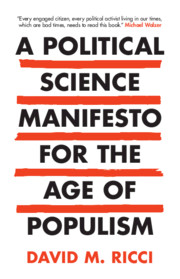A Political Science Manifesto for the Age of Populism
Populism and authoritarian-populist parties have surged throughout the world in the twenty-first century. In the United States, it’s difficult to pinpoint the cause, yet Donald Trump appears to have become the poster president. David Ricci, in this call to arms, thinks Trump is symptomatic of a myriad of changes that have caused a crisis among Americans – namely, mass economic and creative destruction: automation, outsourcing, deindustrialization, globalization, privatization, financialization, digitalization, and the rise of temporary jobs – all breeding resentment, which then breeds populism.
Rather than dwelling on symptoms, Ricci focuses on the root of our nation’s problems. Thus, creative destruction, aiming at perpetual economic growth, encouraged by neoliberalism, creates the economic inequality that fuels resentment and leads to increased populism, putting democracy at risk. In these circumstances, he urges political scientists to highlight this destruction in meaningful and substantive ways, that is, to use empirical realism to put human beings back into politics.
Ricci’s straightforward argument conveys a sense of political urgency, grappling with real-world problems and working to transform abstract speculations into tangible, useful tools. The result is a deeply passionate book, important not only to political scientists, but to anyone who cares about public life.
David M. Ricci lives in Mevaseret, and is a former chair of the departments of American Studies and Political Science at the Hebrew University. He has been a fellow at the Woodrow Wilson International Center for Scholars in Washington, DC, the Institute for Advanced Study in Princeton, New Jersey, and the Brookings Institution. He is the author of seven books, including The Tragedy of Political Science (1984), The Transformation of American Politics (1993), Good Citizenship in America (2004), Why Conservatives Tell Stories and Liberals Don't (2011), and Politics Without Stories (2016).



